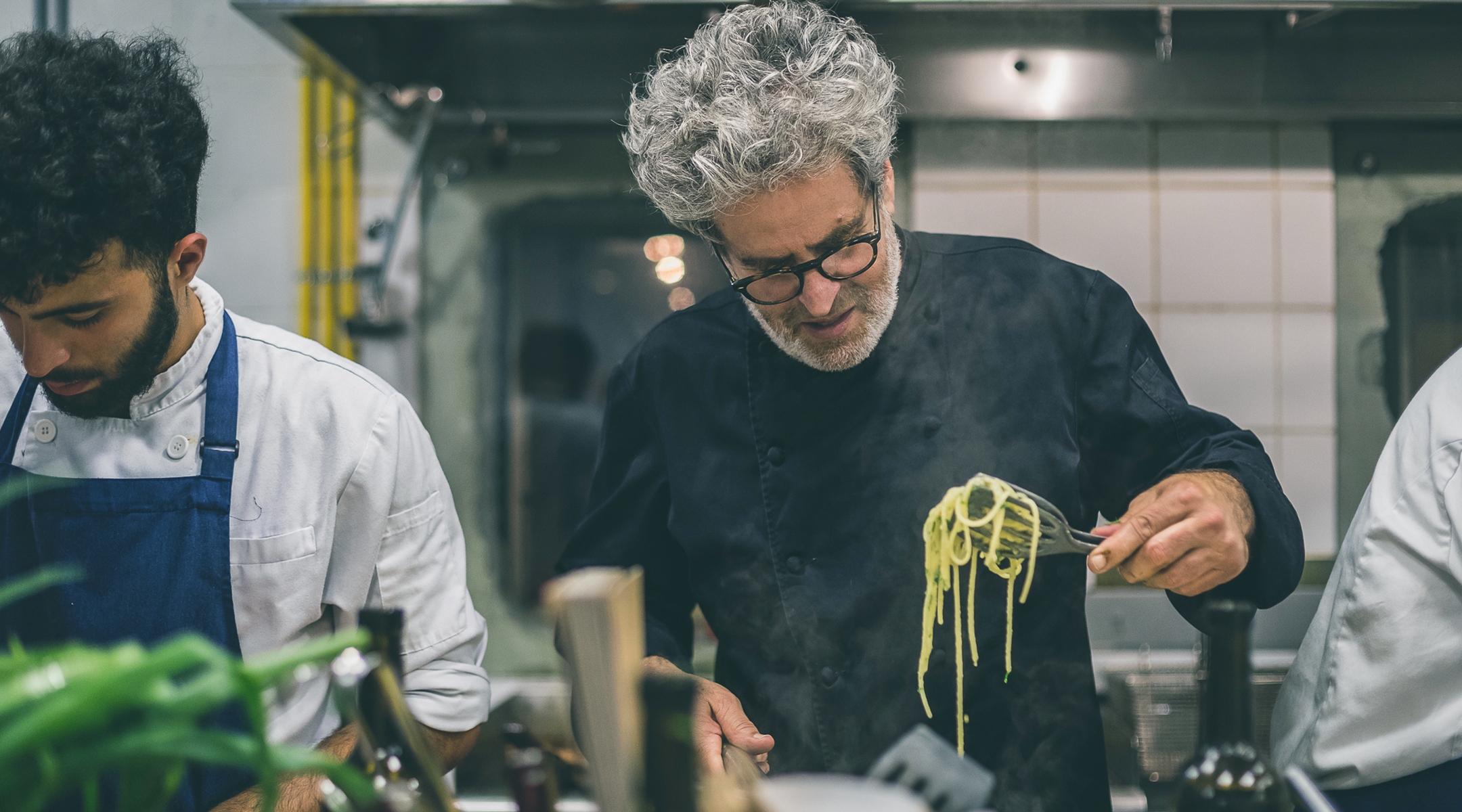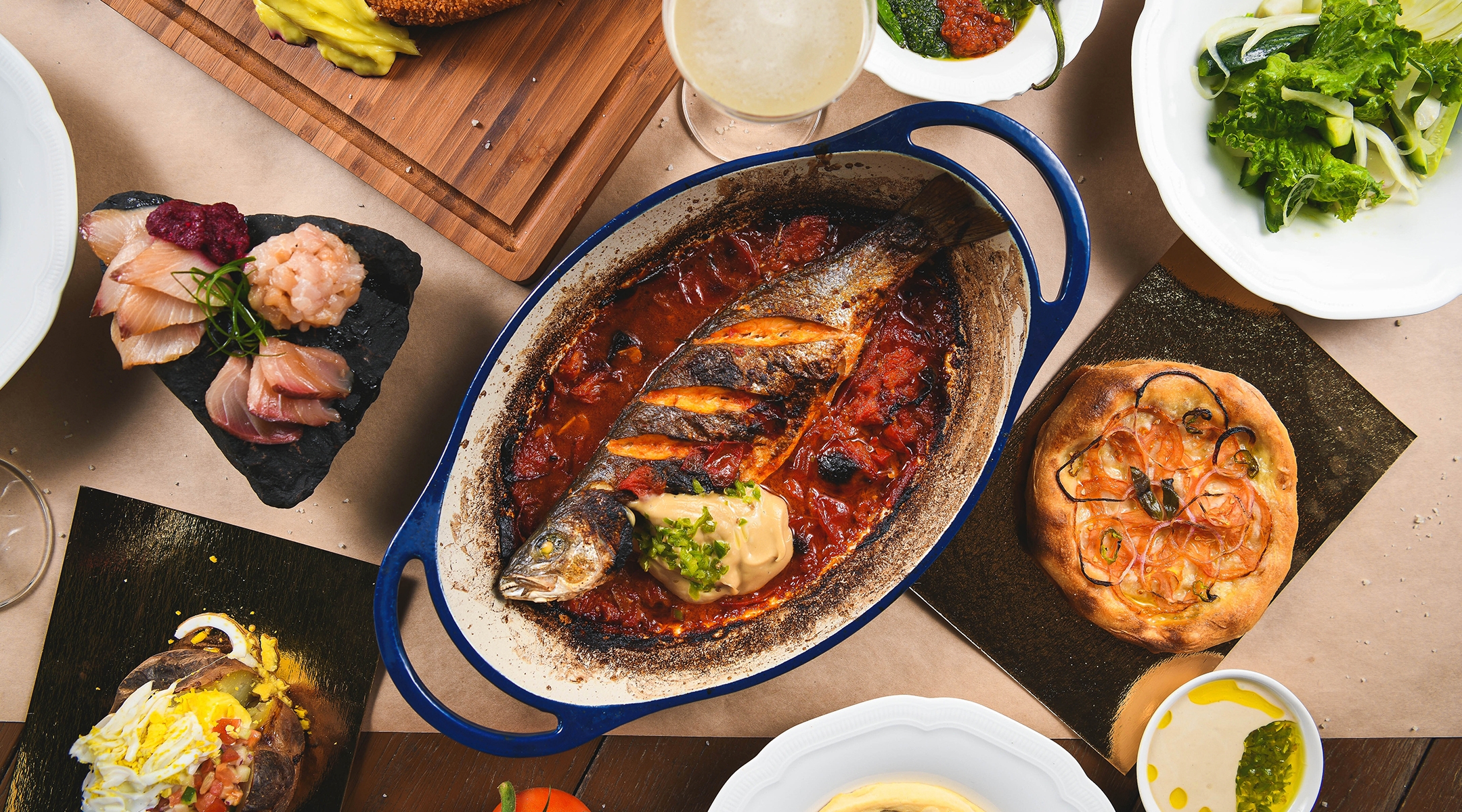(New York Jewish Week) — Celebrity Israeli Chef Eyal Shani arrived in New York City early on Monday morning, two days before the launch of Malka — his 41st restaurant and his first certified kosher eatery outside of Israel.
For several weeks, he had deliberated as to whether he should fly in for the grand opening on Wednesday night. “It is the first time in my life that I don’t have the will to travel, to get out of Israel, because of the situation in Israel now,” Shani told the New York Jewish Week.
Shani has been working almost nonstop since the war in Israel began on Oct. 7. He immediately closed all 12 of his restaurants in Tel Aviv and converted their kitchens into what he calls “food factories,” where volunteers cooked 4,000 meals each day which were then delivered to the soldiers on the front line. Even children were involved: some came to restaurants and painted pictures that were included in the packages for the soldiers.
But last week, Shani shut down the food factories and re-opened several of his Tel Aviv restaurants. “We understood that we need a place for our clients to be in, to talk, to argue with each other,” Shani said. “We have to bring back our workers. That is the reason why we opened in Israel.”
It’s been an incredibly busy time for the high-profile chef. In addition to his activism, the day-to-day pressures of running a global restaurant empire and the incomprehensible stress of living through a brutal war, Shani has been busy earning accolades: Last week, Shani won his first-ever Michelin star for Shmoné, his seasonally-focused restaurant on West 8th Street in Greenwich Village.
“When I heard we won the Michelin star, I was happy, but not so much, because there is no place for happiness now,” said Shani, who added that he was “cooking for soldiers” when the star was awarded. “But when I saw my partners, my chefs, climb to the stage to get the star, and I saw the flag of Israel on their jacket, I began to cry. That was my happiness. And that is my happiness to open a kosher restaurant, too.”
Shani’s goal with the New York outpost of Malka, which opens to the public on Sunday and is located at 161 West 72nd Street on the heavily Jewish Upper West Side, is to create a kosher restaurant that does not feel like most kosher restaurants. Case in point: At the moment, Shani is hard at work creating a signature dish for the restaurant, a Jewish-inflected ramen soup made with chicken.
“Chicken soup is the best soup in the world,” he said, echoing the sentiment of Jewish grandmothers everywhere. “I am going to develop an amazing ramen based on the chicken stock. I hope I will succeed in making the best ramen in New York.”
Shani himself does not keep kosher, but five years ago he opened Malka in Tel Aviv — which, at the time, was the only kosher restaurant in his portfolio. He did so, he said, because he saw that kosher consumers were “craving” his food but they couldn’t eat it because it was not kosher.
“These people are part of my nation,” Shani said. “Part of my people. How can I make food without letting half of my people eat it? That is the main reason I opened Malka.”
These days, in addition to the forthcoming Malka in Manhattan, Shani operates two kosher certified restaurants in Israel. In Paris, three locations of his fast-casual pita chain Miznon use all-kosher ingredients but they are not certified kosher.

Israeli chef Eyal Shani at Malka, his kosher restaurant in Tel Aviv. The celebrity chef is opening his first-ever kosher restaurant, also called Malka, on the Upper West Side in November 2023. (Ariel Efron)
In addition to ramen, New York Malka will have the thinly-pounded schnitzel stuffed with mashed potatoes that is a signature dish in his Tel Aviv Malka, as well as his popular beetroot carpaccio and Jerusalem mezze platter, featuring falafel and hummus made from Mexican chickpeas. Shani hopes that Malka’s seasonal menu showcasing the flavors of Israeli cuisine will be a draw for Jews and non-Jews alike.
“I had a dream one night that the food would be so good that even non-kosher people would go to the restaurant,” said Shani, “and kosher people would come to eat and at the end of the night they would dance together in the bar.”
Adeena Sussman, cookbook author and a keen observer of modern Israeli cuisine, agrees that Shani’s food is different from the food you would find at other kosher establishments.
“Eyal Shani restaurants are not meat-centric,” Sussman said. “It is interesting for the kosher crowd because kosher diners have typically been known to be very carnivorous.”
“Maybe he is helping gently nudge people towards a more plant-celebratory eating experience,” she added.
Shani, who cites his vegan grandfather as a major inspiration, told the New York Jewish Week that while meat and fish are certainly on Malka’s menu, more than half of the offerings will be plant-based.
“Olive oil is my main ingredient,” he said. “If olive oil disappeared from the world, I would quit and leave the profession. I would not be a chef.” This is especially true at a kosher establishment, where the mixing of milk and meat is prohibited. At his other New York restaurants, including the upscale HaSalon and Shmoné, the chefs use superb olive oils that come from Spain, Italy and Israel. He plans to do so at Malka, too.
The produce will also be premium quality. “All of the vegetables will be from upstate New York or California,” he said. But the tomatoes, he added — a central feature of Shani’s cuisine — will all be local. “Real tomatoes cannot travel,” he said.
Just as Shani was uncomfortable about leaving Israel during the war, many Jewish restaurant-goers seem to be conflicted about the morality of dining out and having fun while a war rages in Israel. Kosher restaurants in New York are suffering, according to Elan Kornblum, publisher of Great Kosher Restaurants Media Group. But despite consumers’ hesitation to enjoy life while the war with Hamas is ongoing, interest in Shani’s kosher eatery is high.
Kornblum posted Malka’s menu on his organization’s Facebook page, and it garnered more than 50,000 views in less than three weeks. The average number of views for his posts are about 5,000, he said. “If something gets 40,000-50,000 views, you know people are excited and are sharing,” he said. “It is big news.”
Shani understands the discord that some people feel about returning to life – and to restaurants. But he feels strongly that it is important to do so.
“There is no reason for anything if we are not going to build a normal life, a peaceful life, or if we are not going to try to bring quality and happiness and hope to people,” he said.
The New York Jewish Week brings you the stories behind the headlines, keeping you connected to Jewish life in New York. Help sustain the reporting you trust by donating today.





